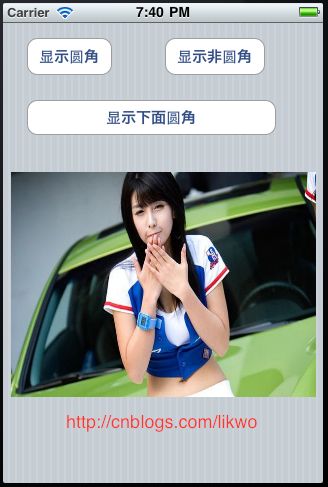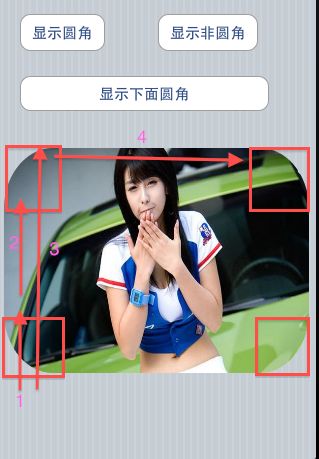UIImageView 圆角
UIImageView *tmpLargeIconView = [[UIImageView alloc] initWithFrame:CGRectMake(20.0, 40.0, 280.0, 280.0)];
CALayer *layer = [tmpLargeIconView layer];
[layer setMasksToBounds:YES];
[layer setCornerRadius:10.0];
------------------------------------------------------------------------------------
以下为转载
创作品,允许转载,转载时请务必以超链接形式标明文章 原始出处 、作者信息和本声明。否则将追究法律责任。http://no001.blog.51cto.com/1142339/637732
一般图片圆角显示都是四个角都显示圆角,如果只有这个功能需求,采用常用的方法就可以了,也不用费那么多事情。但是在有些情况下需要只显示图片的2个圆角,就不太好实现了。
先看效果图 ,未做圆角转换的图片
做了4个角的圆角转换的图片
只做了下面2个圆角转换的图片
如何实现画四个方向的弧线呢?
先看看示意图
头文件
#import < Foundation / Foundation.h >
typedef enum {
UIImageRoundedCornerTopLeft = 1 ,
UIImageRoundedCornerTopRight = 1 << 1 ,
UIImageRoundedCornerBottomRight = 1 << 2 ,
UIImageRoundedCornerBottomLeft = 1 << 3
} UIImageRoundedCorner;
@interface UIImage (Utility)
// + (void)addRoundedRectToPath(CGContextRef context, CGRect rect, float radius, UIImageRoundedCorner cornerMask);
- (UIImage * )roundedRectWith:( float )radius cornerMask:(UIImageRoundedCorner)cornerMask;
@end
实现文件
// UIKit坐标系统原点在左上角,y方向向下的(坐标系A),但在Quartz中坐标系原点在左下角,y方向向上的(坐标系B)。图片绘制也是颠倒的。
static void addRoundedRectToPath(CGContextRef context, CGRect rect, float radius, UIImageRoundedCorner cornerMask)
{
// 原点在左下方,y方向向上。移动到线条2的起点。
CGContextMoveToPoint(context, rect.origin.x, rect.origin.y + radius);
// 画出线条2, 目前画线的起始点已经移动到线条2的结束地方了。
CGContextAddLineToPoint(context, rect.origin.x, rect.origin.y + rect.size.height - radius);
// 如果左上角需要画圆角,画出一个弧线出来。
if (cornerMask & UIImageRoundedCornerTopLeft) {
// 已左上的正方形的右下脚为圆心,半径为radius, 180度到90度画一个弧线,
CGContextAddArc(context, rect.origin.x + radius, rect.origin.y + rect.size.height - radius,
radius, M_PI, M_PI / 2 , 1 );
}
else {
// 如果不需要画左上角的弧度。从线2终点,画到线3的终点,
CGContextAddLineToPoint(context, rect.origin.x, rect.origin.y + rect.size.height);
// 线3终点,画到线4的起点
CGContextAddLineToPoint(context, rect.origin.x + radius, rect.origin.y + rect.size.height);
}
// 画线4的起始,到线4的终点
CGContextAddLineToPoint(context, rect.origin.x + rect.size.width - radius,
rect.origin.y + rect.size.height);
// 画右上角
if (cornerMask & UIImageRoundedCornerTopRight) {
CGContextAddArc(context, rect.origin.x + rect.size.width - radius,
rect.origin.y + rect.size.height - radius, radius, M_PI / 2 , 0.0f , 1 );
}
else {
CGContextAddLineToPoint(context, rect.origin.x + rect.size.width, rect.origin.y + rect.size.height);
CGContextAddLineToPoint(context, rect.origin.x + rect.size.width, rect.origin.y + rect.size.height - radius);
}
CGContextAddLineToPoint(context, rect.origin.x + rect.size.width, rect.origin.y + radius);
// 画右下角弧线
if (cornerMask & UIImageRoundedCornerBottomRight) {
CGContextAddArc(context, rect.origin.x + rect.size.width - radius, rect.origin.y + radius,
radius, 0.0f , - M_PI / 2 , 1 );
}
else {
CGContextAddLineToPoint(context, rect.origin.x + rect.size.width, rect.origin.y);
CGContextAddLineToPoint(context, rect.origin.x + rect.size.width - radius, rect.origin.y);
}
CGContextAddLineToPoint(context, rect.origin.x + radius, rect.origin.y);
// 画左下角弧线
if (cornerMask & UIImageRoundedCornerBottomLeft) {
CGContextAddArc(context, rect.origin.x + radius, rect.origin.y + radius, radius,
- M_PI / 2 , M_PI, 1 );
}
else {
CGContextAddLineToPoint(context, rect.origin.x, rect.origin.y);
CGContextAddLineToPoint(context, rect.origin.x, rect.origin.y + radius);
}
CGContextClosePath(context);
}
@implementation UIImage (Utility)
- (UIImage * )roundedRectWith:( float )radius cornerMask:(UIImageRoundedCorner)cornerMask
{
UIImageView * bkImageViewTmp = [[[UIImageView alloc] initWithImage:self] autorelease];
int w = self.size.width;
int h = self.size.height;
CGColorSpaceRef colorSpace = CGColorSpaceCreateDeviceRGB();
CGContextRef context = CGBitmapContextCreate(NULL, w, h, 8 , 4 * w, colorSpace, kCGImageAlphaPremultipliedFirst);
CGContextBeginPath(context);
addRoundedRectToPath(context,bkImageViewTmp.frame, radius, cornerMask);
CGContextClosePath(context);
CGContextClip(context);
CGContextDrawImage(context, CGRectMake( 0 , 0 , w, h), self.CGImage);
CGImageRef imageMasked = CGBitmapContextCreateImage(context);
CGContextRelease(context);
CGColorSpaceRelease(colorSpace);
UIImage * newImage = [UIImage imageWithCGImage:imageMasked];
CGImageRelease(imageMasked);
return newImage;
}
@end
实现方法如下:
{
UIImage * rectImage = [UIImage imageNamed: @" test.jpg " ];
self.imageView.image = rectImage;
}
- (IBAction)showRoundImage
{
UIImage * rectImage = [UIImage imageNamed: @" test.jpg " ];
UIImage * roundImage = [rectImage roundedRectWith: 100
cornerMask:UIImageRoundedCornerBottomLeft | UIImageRoundedCornerBottomRight | UIImageRoundedCornerTopLeft | UIImageRoundedCornerTopRight];
self.imageView.image = roundImage;
}
- (IBAction)show2RoundImage
{
UIImage * rectImage = [UIImage imageNamed: @" test.jpg " ];
UIImage * round2Image = [rectImage roundedRectWith: 100
cornerMask:UIImageRoundedCornerBottomLeft | UIImageRoundedCornerBottomRight];
self.imageView.image = round2Image;
}
对于四个角,用下面的角进行逻辑或的方法。
UIImageRoundedCornerBottomLeft
项目文件下载
参考URL
http://stackoverflow.com/questions/4847163/round-two-corners-in-uiview
http://stackoverflow.com/questions/4845211/just-two-rounded-corners
http://blog.sallarp.com/iphone-uiimage-round-corners/
出处http://no001.blog.51cto.com/1142339/637732



